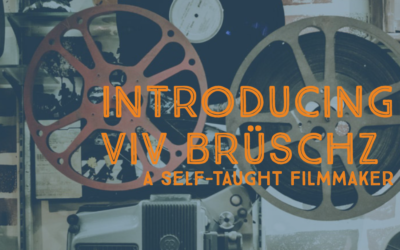How did you get inspired to become a filmmaker?
I started making films to help colleagues and myself communicate more directly with audiences for whom the world of research was not easily accessible.
I’m originally a research biologist, and helped uncover details that could fundamentally change the way we viewed our lives, habits and everyday assumptions. However, only a small number of people in the world had first-hand access to that information, and the rest had to interpret it through the spin of media, corporations or pundits. I needed to find ways to reach the people I cared about most.
Filmmaking allows me to convey more connections and moving parts in a story than I could be responsible for as a researcher.
What is your favorite part about the short film form?
Audience accessibility! Short films can be shown in a wide variety of circumstances, and can be made available at low cost to both the viewer and filmmaker.
Who were the people that supported the making of this film?
The support of biologist, David Reznick, was absolutely critical. Interacting with him was the primary inspiration for me to make the leap of faith to switch careers. He trusted me to film his research team and helped me gain the trust of multiple researchers and educators. Trust is the most important ingredient when filming documentaries.
Trinidadian film makers, Luke Paddington, Oliver Milne (http://www.milnefilm.com/) and Shane Hosein showed me the basics when I knew absolutely nothing about film making. Their help enabled me to practice thinking big about what I could do on a tiny budget.
Thomas Miller of PrettyGoodProductions.net has been a wonderful friend, camera man, and my main advisor on editing.
At two critical points, the efforts of Dr. Amy Deacon, at the University of the West Indies, made the difference between this project going forward vs. grinding to a halt.
My wonderful wife continues to be supportive and patient with me through the process.
My father, now into his 70s, has been the “point man” for tricky logistics.
What resources do you use as a filmmaker? Music, locations, props, editing, crew, etc.
My resources keep changing with experience and technology. Two years ago, I had absolutely zero budget, and edited using whatever was available on open-source Linux platforms. Now I use the Adobe creative suite.
What is your next project?
My next project is on current “revolutions” in tropical agriculture: The political and biological ramifications of agroecology and agroforestry. Agriculture takes up more land, water and resources than any other activity on earth. In the tropics, this drives economic and weather systems. Despite recent productions on similar topics, the biology behind the choices we make is still under-reported, and cultural impacts are still under-represented. Even though it’s much easier to talk now about sustainable food production than it was years ago, there are many perspectives that still need to be more widely known. There are also more varied, hopeful and insightful options for the future than most people recognize.
The independent film business is a difficult one. What keeps you motivated? Where do you see the industry going in the future?
I’m motivated by the capacity of film to reach people, and the resulting potential to affect culture. A lot of old dogmas about film are changing with technology. Most films are not even made using film anymore. I’m guessing technologies that enable new sensory niches or new ways of capturing attention will affect the industry a lot.
Which filmmakers, artists or individuals have most influenced your work?
Sir David Attenborough, because he influenced the evolution of documentaries over decades and gave the genre respectability. His efforts have been launching platforms for things we see today like the BBC Natural History Unit and their “Planet Earth” Series. He also wrote for documentary benchmarks like “Trials of Life” and “Blue Planet”.
James Cameron, Jacques Cousteau and George Lucas and have important to me because of the ways they combine technological innovation, film making and outreach. I’m fascinated by examples of how they go from behind-the-scenes information-gathering, to entertaining massive global audiences with projects and inventions that radicalize on-screen viewing, and repeatedly serve as source material for succeeding generations.
Frank Herbert, has influenced me most because his work gave me the clearest examples of storytelling techniques that enable us to talk insightfully about topics people typically have trouble discussing. His work made it easy for me to explain why storytelling is such an essential part of human cultures.
What advice would you give new filmmakers?
Four suggestions:
First. “The best camera you can use is the one that is in your hand”.
Second. “Don’t wait to get going!”. Make every attempt as productive as possible, but don’t procrastinate for fear of being unproductive.
Third. “Stay open-minded”. Especially in the beginning. Treat everyone as well as possible and get along with everyone and their opinions. It’s important to learn as much from each experience as possible.
Fourth. “Don’t stress”. When “enjoying the process”, you are most creative and adaptable. That is when you are able to turn all the unexpected scenarios into beneficial ones, no matter what you were anticipating before, or how “impossible” a turn of events may make things seem.
Watch and vote for Home of the Guppy
Visit http://www.sii-inc.org/media/
This pitch is competing in the REELPITCH Challenge, Remember you can vote once a day for the duration of the contest for as many pitches as you deem worthy!
VOTING OPENS
Aug 09, 2016 at 9:00am MDT (America/Denver)
VOTING CLOSES
Aug 18, 2016 at 9:00pm MDT (America/Denver)
The Audience Awards provides filmmakers opportunities to create short video content for brands and win money. Sign up today for your free account and join film’s community.




